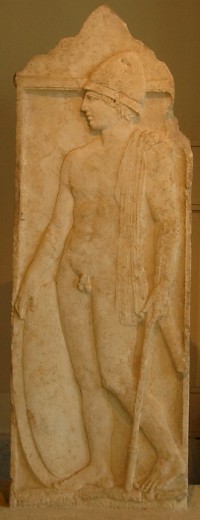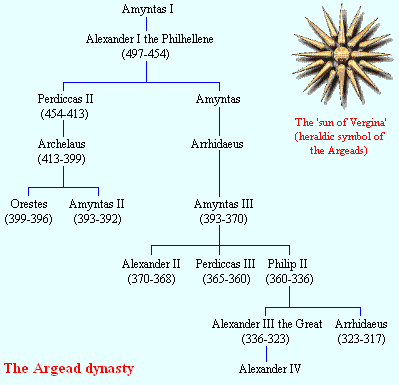Macedonia (4)
Q83958Macedonia: ancient landscape and state, situated in the Former Yugoslav Republic of Macedonia and northern Greece, best known because its king Alexander the Great (r.336-323) conquered the Persian Empire and inaugurated a new period in Greek history.
Fifth century

Greece and Macedonia had been on opposing sides during the Persian war. Other developments acerbated the opposition. As long as Athens ruled the waves, naval commerce was easy and safe, and many towns in the Aegean Sea experienced an economic boom. Athens, Miletus, Argos, and Corinth benefited, but Macedonia, which lacked a good port, did not. (Even Sparta had better access to the interregional trade routes.) Compared to the Greek towns, Macedonia remained a backward land with conservative customs. The most striking aspect is that it remained a monarchy, ruled by the Argead dynasty.
Alexander was succeeded by his son Perdiccas II (r.454-413). A summary of his foreign policy explains why it took so long for Macedonia to become the superpower that it potentially was:
- In 433, he had to fight against Athens, which supported one of his dynastic rivals.
- In 431, he concluded a peace treaty with Athens but
- he immediately quarreled with Methone, an Athenian ally. Athens was too occupied with the Archidamian War against Sparta to intervene at full strength.
- In 429, he had to ward off an attack from the Thracian king Sitalces, who had probably been convinced to attack Macedonia by the Athenian ambassador Hagnon.
- In 424, Perdiccas supported the Spartan general Brasidas, who in return helped him to strengthen his grip on Lyncestis, one of the western mountain districts; after Brasidas had snatched the strategically important city Amphipolis away from the Athenian alliance (text),
- Perdiccas concluded an alliance with Athens, but
- in 418, he allied himself to Argos.
- But after a couple of years, he joined Athens again.
This means that he revised his position to Athens six times. Perdiccas was, in fact, toying with the Athenians. He needed them as buyers of his timber, but he was ready to benefit when they were weak, and certainly wanted to keep them away from Macedonia as far as possible. On the other hand, the Athenians knew that Perdiccas could not afford a full-blown conflict and they had means to manipulate him as well: for example, by supporting rival candidates to the Macedonian throne.
However, this is only a part of the story. It's only the second half of it. Without any doubt, relations to Greece were equally complex during the first twenty years of Perdiccas' reign. Moreover, similar complex international relations must have existed to the Epirotes in the west, the Illyrians in the northwest, the Paeones in the north, and the Thracian tribes in the east. Only Macedonian kings with special qualities were able to forge their own foreign policy; it was very easy to lose the initiative and become a pawn of foreign powers.
Fortunately, Perdiccas' successor was every inch as competent as his father and grandfather, even though he abandoned Perdiccas' policy. Archelaus (r.413-399) preferred a closer alliance to Athens, which was no longer a superpower after it had incurred the wrath of the Persian king Darius II Nothus, who started to support Sparta in the Ionian War. Archelaus used the profits of the timber and grain trade to improve the Macedonian infrastructure. The historian Thucydides was impressed:
The forts that are now in Macedonia were built by Archelaus [...], who also built straight roads through the country, reorganized the cavalry, the arming of the infantry, and equipment in general, so as to put the country in a stronger position for war than it had ever been before.note
Archelaus also did his best to adopt the Greek way of life. Even a town in the interior like Aeane became an important city that resembled the poleis of the south. In c.410, the old capital Aegae was replaced as royal residence by Pella, a newly founded city. The Athenian playwrights Euripides and Agathon were invited to Macedonia, and the famous painter Zeuxis came to Pella as well.
Archelaus also organized Olympic Games in Dion, at the foot of the holy mountain Olympus. This is interesting, because it suggests that - even though the king may have won a victory at the "real" Olympics - ordinary Macedonians were not allowed to compete in Olympia, and were, therefore, not recognized as Greeks. This is confirmed by the list of victors at Olympia: a substantial part of which survives and it mentions no ordinary Macedonians until the reign of Alexander the Great.
 Not even Archelaus' personal claim to Greekness went unchallenged. Although an author like Thucydides accepted the king's descent from Argos, his contemporary Thrasymachus of Chalcedon exclaimed: "Must we Greeks become slaves of the barbarian Archelaus?" This was, of course, meant as an insult to a man who had done much to look like a Greek, and we may not take this as evidence that Archelaus' policy had failed. On the contrary, it proves that the Thrasymachus understood Macedonian foreign policy, which in turn shows that Macedonia had become a power that mattered. All the same, it is certain that the Greeks did not know what to think of their increasingly powerful neighbor.
Not even Archelaus' personal claim to Greekness went unchallenged. Although an author like Thucydides accepted the king's descent from Argos, his contemporary Thrasymachus of Chalcedon exclaimed: "Must we Greeks become slaves of the barbarian Archelaus?" This was, of course, meant as an insult to a man who had done much to look like a Greek, and we may not take this as evidence that Archelaus' policy had failed. On the contrary, it proves that the Thrasymachus understood Macedonian foreign policy, which in turn shows that Macedonia had become a power that mattered. All the same, it is certain that the Greeks did not know what to think of their increasingly powerful neighbor.
After the assassination of Archelaus, the Macedonian rulers were not in a position to live up to their claim to be Greek. There was no strong king and the Illyrians, Athenians, Spartans, Thebans, and the Greeks from the nearby Chalcidian League tried to expand their influence in Macedonia. In rapid succession, Orestes (r.399-396), Aeropus (r.396-393), Amyntas II and Pausanias (r.393-392), Amyntas III (r.393-370), Alexander II (r.370-368), and Ptolemaeus (r.368-365) were king. Some of them did not even belong to the Argead dynasty.
The barons benefited from the decline of royal power. They may have been able to gain control of the export of cereals and timber, and showed their wealth in splendid tombs. At the same time, they may have started to claim descent from figures of Greek legendary history. For example, the rulers of Lyncestis (a barony in the west of Macedonia) claimed that the Bacchiads of Corinth were their ancestors. Elsewhere, the dynasty that ruled the Epirote Molossians claimed that Achilles was its ancestor, the Enchelei of Illyria did not settle for anyone less than Cadmus, and even as far away as Lavinium in Latium, a sanctuary was dedicated to Aeneas.